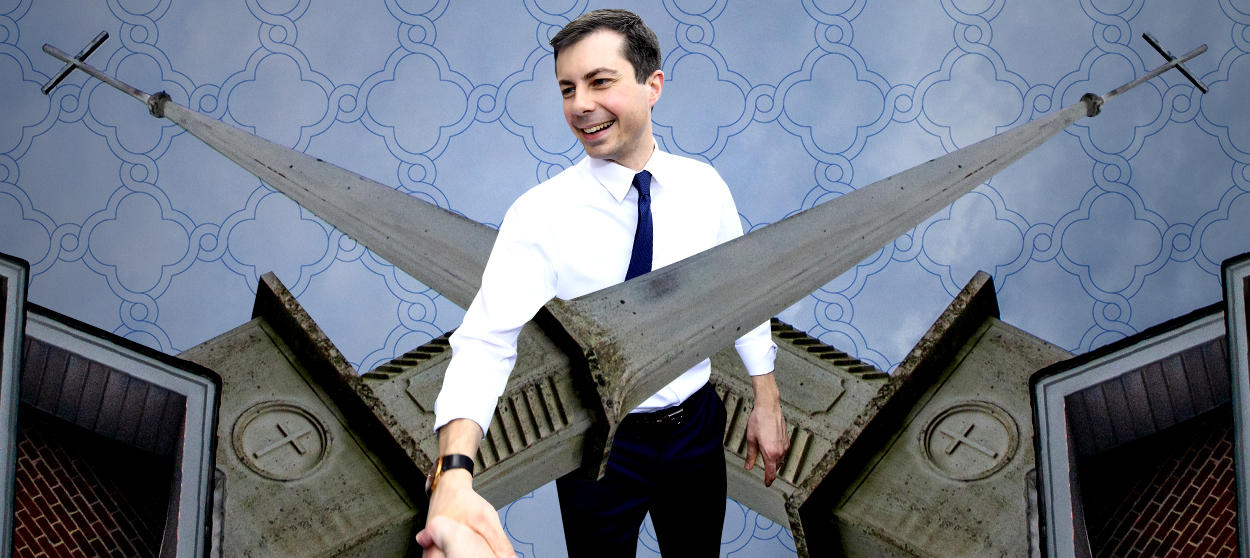Pete Buttigieg's rise exposes a deepening rift in the Christian right
Mayor Pete's meteoric rise has brought the debate over faith and sexual ethics clearly into focus


A free daily email with the biggest news stories of the day – and the best features from TheWeek.com
You are now subscribed
Your newsletter sign-up was successful
Pete Buttigieg is having a moment in the national spotlight. Buttigieg, as most of America now knows, is the mayor of South Bend, Indiana, and a Democratic candidate for the 2020 presidential nomination. He's also gay, married to a man, and a regular churchgoer. And his meteoric rise has brought the debate over faith and sexual ethics clearly into focus.
This debate over same-sex relationships has been tearing apart American churches for years. Sometimes it presents itself as a dividing line between denominations. For example, Episcopalians, of which Buttigieg counts himself, have largely embraced gay rights. Evangelicals mostly have not. Last month, conservative commentator Erick Erickson said that "if Buttigieg thinks evangelicals should be supporting him instead of Trump, he fundamentally does not understand the roots of Christianity. But then he is an Episcopalian, so he might not actually understand Christianity more than superficially."
The debate is also alive and well within denominations themselves. For example, the United Methodist Church — the largest in U.S. mainline Protestantism — recently strengthened its prohibitions of same-sex wedding ceremonies and gay clergy, even while many similar churches have been liberalizing their teachings on homosexuality. Ministers within the Methodist Church are to be celibate while single, and monogamous within marriage. And marriage is defined solely as a union between a man and a woman. The denomination's top court subsequently upheld these positions. This aligns the United Methodists with the Catholic Church, the Southern Baptist Convention, and a growing number of Christians in the Global South. Indeed, it was African delegates, working with U.S. evangelicals, who supplied the margin of victory for the Methodist Church's recent interpretation of Scripture and tradition.
The Week
Escape your echo chamber. Get the facts behind the news, plus analysis from multiple perspectives.

Sign up for The Week's Free Newsletters
From our morning news briefing to a weekly Good News Newsletter, get the best of The Week delivered directly to your inbox.
From our morning news briefing to a weekly Good News Newsletter, get the best of The Week delivered directly to your inbox.
But no doubt many in the church were outraged by the decision. Methodist pastors in the Washington, D.C., area took out an ad in The Washington Post decrying the vote and calling for a more inclusive church. The chaplain at the Methodist college I attended, a longtime ordained minister within the denomination, has even signed on to work for Buttigieg's presidential campaign. Another nearby school ended its affiliation with the Methodist Church over the LGBT vote.
The people on both sides of the religious debate over homosexuality aren't merely talking past each other. Their views on the issue are fundamentally very different from one another. Is our sexuality who we are? Or is it what we do? Are we all sinners in need of redemption? Or does extending that doctrine to sex limit the reach of grace in a manner more reminiscent of racial discrimination?
Buttigieg summed up his view well when addressing his ongoing dispute with Vice President Mike Pence, an evangelical Christian with traditional views on sexual mores. He said that "the Mike Pences of the world" should understand "that if you got a problem with who I am, your problem is not with me — your quarrel, sir, is with my creator."
The nomination of a gay man for the highest office in the land would certainly be unsettling to politically active conservative Christians. With regard to social issues, this group has in recent years focused mostly on abortion and addressing the high costs of raising families, working with liberals on the "two-income trap." To the extent they've focused on LGBT issues at all, it has been in the form of religious liberty protections for believers who oppose same-sex marriage. Buttigieg would shift the focus toward gay rights, where social conservatives are losing ground as more people support gay marriage.
A free daily email with the biggest news stories of the day – and the best features from TheWeek.com
A Buttigieg nomination would also put evangelicals on the defensive over their support for President Trump. After all, how can you say you stand for the sanctity of marriage but still vote for the twice-divorced, thrice-married, locker room-talking, frequently incendiary president? Under Bill Clinton, the Christian right could at least say they were consistently punctilious about a president's personal behavior.
This debate is no longer just between Episcopalians and evangelicals. It's raging between Christians on the left and the right side of the political spectrum. Conservatives have long struggled to grapple with committed same-sex relationships, as well as the increasing number of otherwise theologically orthodox people who disagree with them about sexual ethics. At the same time, liberals have failed to acknowledge that a gendered, heteronormative understanding of human sexuality isn't merely incidental to historic Christian doctrine, limited to stray passages of the Old Testament next to rules about consuming shellfish, and that discarding these teachings is not a minor revision of Scripture or tradition.
Such weighty theological questions aren't likely to be solved in the rough and tumble of a presidential campaign. But the right 2020 developments could get voters — and people in the pews — talking about them.
W. James Antle III is the politics editor of the Washington Examiner, the former editor of The American Conservative, and author of Devouring Freedom: Can Big Government Ever Be Stopped?.
